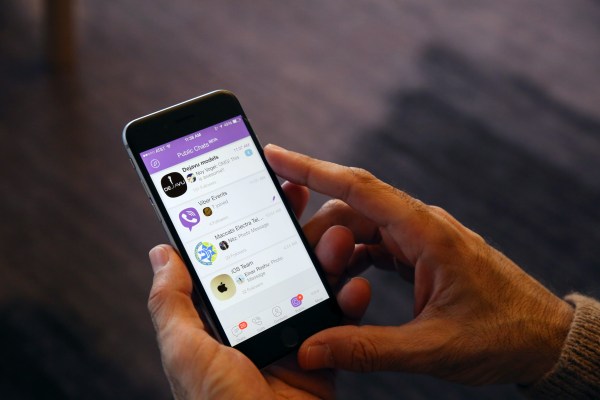Free calling and messaging service Viber could be banned in South Korea, after the company lost a patent suit to domestic operator SK Telecom.
Korea Herald reports that a court ruled in favor of SK Telecom’s claim that Viber’s “feature of reorganizing selected information from contact numbers saved in a smartphone into the application” violated a 2006-registered patent from the operator.
SK Telecom sued Viber, which was bought by Japanese e-commerce firm Rakuten for $900 million last year, back in November. Initially, the operator pursued four patents, however three were dismissed during the court’s investigation.
Viber CEO Talmon Marcus told TechCrunch that the company is “currently studying the matter” before it releases a longer statement. Representatives from SK Telecom did not respond to our requests for comment.
The immediate implication of the ruling is not clear. There’s not been an official announcement that Viber is blocked, although SK Telecom told Korea Herald that its iOS and Android apps would be outlawed in the country.
The real story here is not about Viber, but the potential implications of the patent on other messaging apps.
Patents As Weapons
The patent in question is incredibly vague. Given the similarities in design and functionality of almost all chat apps, it is plausible that it could be used for litigation against many other messaging services.
One in particularly is likely to be in SK Telecom’s thinking: Kakao Talk. The free calling and texting app is thought to be installed on more 95 percent of smartphones in Korea, and its popularity led to parent Kakao merging with Korean web giant Daum in a $3 billion deal last year.
Kakao Talk doesn’t have the international reach of WhatsApp, Facebook Messenger, Line, WeChat and others, but it is utterly dominant in Korea. Korean consumers use it to make free calls and send free messages, not to mention play games. The former two points anger operators which resent that a free app (that runs on their network) is cutting into their potential revenue from voice and SMS services by offering both for free.
We know that SK Telecom and other Korean operators don’t like Kakao, since they ‘throttled’ the Kakao Talk service when it first emerged as a threat.
Viber The Test Case
Marcos previously told Korean media that the lawsuit was a “surprise,” since Viber doesn’t have a particularly large following in the country. That’s important because it gives SK Telecom a perfect test case through which it can asses the potential to make a more legitimate, court-led move against Kakao Talk.
While SK Telecom didn’t respond to our requests for comment, it did provide a quote to Korea Herald which doesn’t rule out the possibility of future litigation.
“The [patent win against Viber] does not necessarily mean that it will spread to other messenger apps like Kakao Talk. We have not reviewed such moves,” an official from the operator is quoted as saying.
A Threat To Operators
The tl;dr here is that operators don’t like having their already shrinking margins reduced by chat apps. While many in emerging markets actually work with the likes of WhatsApp, Line and Facebook to sell packaged data bundles and services to their customers, South Korea is a different place.
The country has a more mature telecom market, and it’s one where much of operators’ customer base are on postpaid deals with data contracts. Multimedia and value-added services are important potential growth areas for operators, but Kakao Talk is a thorn in their side. That’s because the service has become a portal for games and multimedia services, which essentially leaves telecom operators to take the role of ‘dumb pipe’ that provides the data services to power them. Operators would clearly like greater involvement (and revenue) than that.
This patent — no matter how vague — could represent a bargaining chip, or opportunity to change the status quo in Korea in favor of SK Telecom and other operators.
It’s still early days though, and KakaoTalk has not been on the receiving end of action from SK Telecom.
“We are aware of the SKT-Viber ruling, we haven’t received or heard of anything re KakaoTalk from SKT or other operators regarding it at this time,” a spokesperson for Daum Kakao told TechCrunch.
Don’t be surprised if that situation changes in the not-too-distant future.
